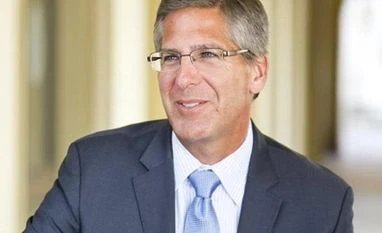Bob Moritz, global chairman, PwC, in an e-mail interview with Ruchika Chitravanshi says the current volatile economic environment is creating challenges for businesses around the world, yet India’s medium- and long-term economic outlook appears to be very strong. Edited excerpts:
What is your sense of global economic prospects amid recession fears and what is the outlook on India?
Global growth is slowing down. Inflation is widespread across most countries, sectors, and income groups, and has, or is close to, reaching its peak in most advanced economies. We expect headline inflation to fall throughout 2023 as energy price rises drop out of the headline inflation rate, supply chain bottlenecks continue to ease, global commodity prices moderate, and the impact of tighter monetary policy is felt more across the real economy. This volatile economic environment is creating challenges for businesses around the world. Corporate bankruptcies are likely to significantly increase in G7 (nations) in the short-to-medium-term as the global economy slows down. We also expect restructuring activity to rise due to increasing costs, rising interest rates and weaker demand. In India, we expect the economy to grow by 5-7 per cent per annum. Demand from its large consumer base continues to increase, making India’s medium- and long-term economic outlook very strong.
You have said PwC would not go the EY way in separating audit and non-audit business. How would you address any conflict of interest and regulatory pressure in some economies?
We have stringent internal controls and processes in place, designed to identify and address potential conflicts, comply with relevant regulations, and act in accordance with PwC codes of conduct and frameworks for ethical decision-making at both country and network levels.
The multidisciplinary model is at the heart of our strategy, The New Equation, which we launched over a year ago to help our clients address two interconnected needs: To build trust with stakeholders and deliver sustained outcomes. A balanced portfolio of audit, tax and advisory work – with appropriate restrictions on the services delivered to the organisations we audit – enables our firms to bring highly relevant specialist expertise, experience and insights to our stakeholders, as well as a culture of objectivity of mind and professional scepticism.
Where do you see India in the global pecking order for PwC and what are the big challenges you face here?
With its 150-year legacy and history of financial success, our firm in India is an important part of the PwC network. It has been very close to being the fastest-growing firm in the past few years, and achieved 22 per cent revenue growth in last fiscal year by supporting Indian businesses on their transformation journeys.
The next decade is going to be significant for India. We see huge opportunities to help clients, the government, and other stakeholders address their biggest challenges. One of the challenges in India is that our talent pool is no longer centred in metro cities. The pandemic has amplified this trend, causing a reverse migration of the working population to their hometowns.
We have taken this as an opportunity to enhance our domestic presence. We opened offices in three new locations this year alone to leverage the wealth of skilled professionals in states like UP, Odisha, and Rajasthan. And we plan to open a few more offices in the coming year. This aligns with the Indian government’s $5 trillion aspiration.
The pandemic period was among the strong years for Big Four. How have things been processed since?
Businesses today have to navigate the fundamental changes in the operating environment triggered by the pandemic, including technological disruption, climate change, and fractured geopolitics.
We bring on board a combination of multidisciplinary expertise with an expansion of specialist capabilities, including cybersecurity, data privacy, ESG, and artificial intelligence. In India, we are coupling the power of technology with expertise in areas like strategy, risk, deals, management consulting, and tax strategy to create sustained value for our clients. We are also investing in both upskilling and making the right acquisitions. We’ve seen significant growth in revenues from our priority accounts, and this is a testament to the power of this multidisciplinary firm and our platform approach.
What are your hiring plans globally and in India, and which are the areas witnessing a rapid expansion?
When we launched our global strategy in 2021, we committed to creating 100,000 net new jobs within five years, and I am happy to say that we are on track to exceed this target.
The talent search and development in India is aligned with our investments in building deeper capabilities in cloud, advanced analytics, machine learning, and other emerging technologies. ESG and cyber risk-related jobs are other focus areas. The domestic market is a huge focus and the firm is looking to expand its reach to come closer to clients and, like I said earlier, to tap into the immense talent pools across the country. We will continue to organically build on our competencies, hire from different backgrounds and with diverse skill sets, strengthen existing problem-solving capabilities and add scale. One example is the recent acquisition of Venerate Solutions, which has not only bolstered our Salesforce capabilities, but also deepens our culture of technology. There are still more to come in this space.
Unlock 30+ premium stories daily hand-picked by our editors, across devices on browser and app.
Pick your 5 favourite companies, get a daily email with all news updates on them.
Full access to our intuitive epaper - clip, save, share articles from any device; newspaper archives from 2006.
Preferential invites to Business Standard events.
Curated newsletters on markets, personal finance, policy & politics, start-ups, technology, and more.
)